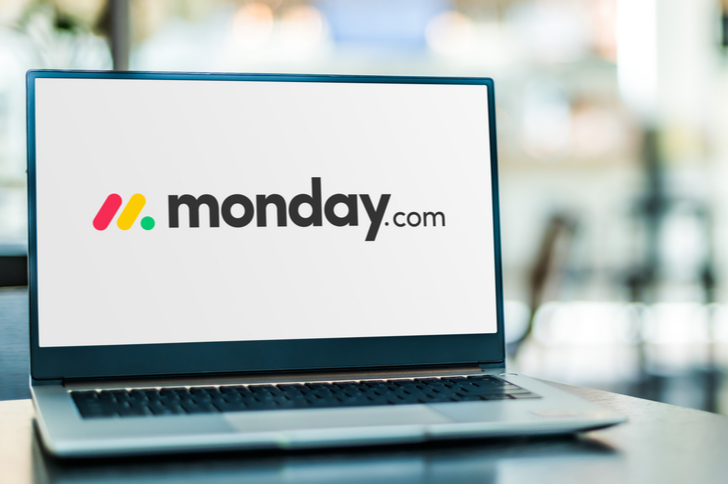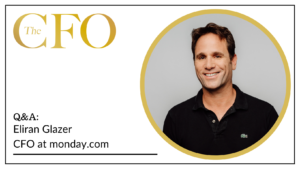Q&A: Eliran Glazer, CFO at monday.com on his first IPO
The CFO spoke with Eliran Glazer, CFO at monday.com, on leading his first IPO and navigating a culture of transparency
The CFO spoke with Eliran Glazer, CFO at monday.com, on leading his first IPO and navigating a culture of transparency

Transitioning from a private company to a public one is a key milestone in a company’s journey. In 2021, it was a record year for IPOs, with monday.com joining 752 other new listings on Nasdaq.
Hired in the middle of the company’s Initial Public Offering (IPO) process, Eliran Glazer stepped in as CFO having days to adjust and get to grips with a new company while it was going through a pivotal moment.
Speaking to The CFO, Glazer shares his experience of leading his first IPO and how he’s maintaining monday.com’s culture of transparency in a highly regulated market.

You were hired at monday.com to specifically help manage the company’s IPO process. Can you describe that experience?
It was a unique experience. I joined in February 2021, and we went public in June. In those four months, I had to learn monday.com, understand the business, get to know its people and work with the stakeholders and the board.
Usually, you would spend an amount of time in a company before you take it public. I came in and was brought into a room where they said “there is an IPO going on, it’s yours”. I had to prioritise my time, learn the business, and speak to the bankers and analysts. Luckily, I had great people working with me which helped a lot.
There were very long days and very long nights. I listened to a lot of podcasts about IPOs and read about how other companies managed theirs. People tend to think it’s a numbers thing but it’s a cultural thing. It’s storytelling. So, for me, it was also about getting connected to the culture and values of monday.com to build the financial story within that. It was quite an experience.
How ready was monday.com to go public when you joined the company?
We were more than halfway there but there were many things we had to take care of. The company decided to go public a few months beforehand. One of the things you have to understand about taking a company to IPO is it’s not the main thing, it’s a milestone. Once you’re a public company, there is a routine of quarterly reports and the market is not forgiving if you’re not ready.
My main focus was on making sure the data is accurate and we can support producing financial reports in a way that will comply with the SEC regulations. From a product perspective, we were ready. From a business perspective – growth, numbers, customers –, we were ready. We hired people throughout the process, making sure that we had the right staff in accounting, FP&A, tax and compliance. It was a very intensive concentrated process and we closed many of those gaps we had left.
What are some of the key challenges you encountered in the transition from a private company to a public one, and how did you navigate them?
One of the values at monday.com is we believe in full transparency. If you go into monday.com offices, everything is on screens. When you become a public company, not everything can be shared because there are all kinds of guidelines and regulations. So, how do you educate employees if they see data on the screen not to tell their friends? For example, if they say monday.com had a great month and you tell it to someone who buys our shares, it’s a problem.
The main challenge was making sure transparency is taken care of. We worked with legal and we produced a lot of videos explaining what it means to be a public company, what it means to share data, and what it means to disclose things you shouldn’t disclose etc.
Another challenge was gearing up our young finance team for the IPO, while I was learning the ins and outs myself. Many of the people on my team were early in their career and had never faced a high-pressure situation like an IPO before — with a lot of coaching and a lot of time spent together, we were able to bring everyone on the same page and working towards one vision for what it would mean for monday.com to transition successfully into a public company.
What changes did you make to the finance function to ensure the company was ready to go public?
First of all, and most importantly, is data integrity. I wanted to show that for every bit of data we produce, I have the backup and understand where it’s coming from. I made sure the systems, in terms of measurements, ERP system […] could support producing the data and we had specialized people to work it.
We also worked on shortening the cycles of when we produce monthly reports because you have to meet certain timelines.
There are many things you have to do other than the financials. For example, making sure we have someone responsible for compliance and bringing in a chief information security officer (CISO) who’s responsible for data security.
Over the next couple of years, what do you see as the biggest challenges for you?
The big challenge for me is to deliver on our promises. If you think about the last 10 years, there were many great companies that never reached profitability or a positive cash flow. There is a relationship between me and the investors; they put the money in monday.com and I, as a CFO, need to spend the money in a very wise way.
One thing is to give our shareholders a good return on their investment and the second is to make sure that they trust me. In good times, everything is great but in stressful times, I want to make sure they don’t sell the company’s shares.
The second challenge is maintaining the culture of monday.com. I don’t want this to be just a corporate company, I want it to still be a very creative, savvy, young mentality company, but also with the maturity to scale and take it to the next level.
Those are the challenges and I need to be very clear about my expectations and be part of the process.